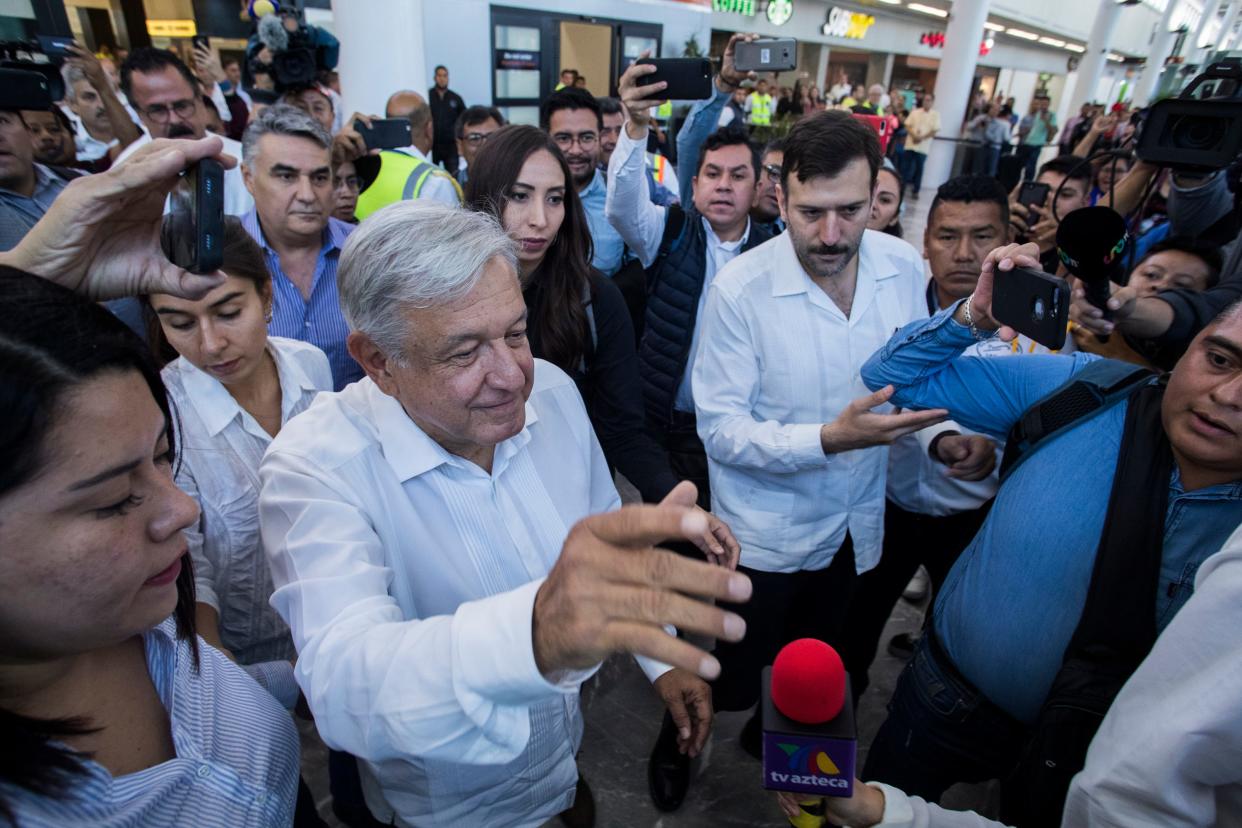Mexican president to 'celebrate' in Tijuana after Trump pulls tariff threat

Mexican president Andrés Manuel López Obrador is calling on his country's citizens to gather in Tijuana Saturday evening to "celebrate" an agreement with the United States that ended the Trump administration's threat of imposing an escalating series of tariffs on all Mexican imports.
López Obrador, also known as AMLO, arrived at Tijuana International Airport at 12:30 p.m. Saturday.
As he exited the terminal and made his way through a throng of supporters and journalists toward a vehicle waiting for him, the Mexican president said the negotiations with the United States "were resolved well, without conflict."
After days of high-stakes negotiations on how to stem the flow of Central American migrants toward the countries' shared border, the two governments reached the agreement Friday.

The White House had originally threatened to impose tariffs, which would have started Monday at 5% and could have reached 25% by October, to pressure Mexico into stopping migrants from reaching the U.S.-Mexico border.
President Donald Trump said Friday he will not put tariffs on Mexico after it agreed to take new measures to stop the illegal flow of migrants into the U.S.
June 7: Trump pulls Mexico tariff threat while claiming deal over migrants reached
In a tweet Friday night, López Obrador announced the avoidance of tariffs and thanked all Mexicans for their support.
"We will congregate to celebrate tomorrow in Tijuana at 5 p.m.," he wrote in Spanish. The president first called for the gathering Thursday amid the tariff negotiations, billing it as "an act of unity in defense of Mexico’s dignity and in favor of friendship with the United States.”
Gracias al apoyo de todos los mexicanos se logró evitar la imposición de aranceles a los productos mexicanos que se exportan a EEUU. Marcelo Ebrard dará detalles del arreglo; de todas maneras, nos congregaremos para celebrarlo mañana en Tijuana a las 5 de la tarde. pic.twitter.com/Cqd79lSJpu
— Andrés Manuel (@lopezobrador_) June 8, 2019
The U.S. and Mexican governments released a joint statement Friday evening detailing how they will "work together to immediately implement a durable solution" to the "humanitarian emergency and security situation."
According to the statement, Mexico will take "unprecedented steps" to curb the flow of migrants, including deploying its National Guard throughout the country, particularly to its southern border with Guatemala. Mexico also will take "decisive action" to dismantle human smuggling and trafficking organizations, and their illicit financial and transportation networks, the statement said.
Additionally, the U.S. will "immediately" expand a policy requiring non-Mexican asylum seekers to wait in Mexico for a judge to rule on their claim, the statement said. The policy, known as the Migrant Protection Protocols, will be implemented across the entire southern U.S. border, the statement said.
In response Mexico will authorize the entrance of these asylum seekers for humanitarian reasons and offer them jobs, health care and education, the statement said.
The two countries also vowed to work with regional and international partners "to build a more prosperous and secure Central America to address the underlying causes of migration, so that citizens of the region can build better lives for themselves and their families at home," the statement said.
June 3: Trump's tariff threat over migration prompts sharp response from Mexico: 'There is a clear limit'
May 31: Mexico responds to Trump tariff announcement
While Trump praised the deal, it does not meet his most controversial demand: that Mexico agree to be designated a safe third-party country, which would have meant accepting asylum applications from thousands of Central American migrants.
Trump wrote on Twitter Saturday morning that, "Mexico will try very hard and if they do that, this will be a very successful agreement for both the United States and Mexico!" He also wrote that Mexico had agreed to buy "large quantities of agricultural product" from U.S. farmers.
June 8: U.S. and Mexico reach last minute deal to 'indefinitely' suspend tariffs
AMLO has in the past argued the migrant crisis will be solved only through economic development in Central America, not by a harsh immigration crackdown. In December, the Mexican president asked the Trump administration to partner with Mexico on a Marshall Plan for Central America – envisioning a $30 billion investment over the next five years to create jobs in the region. Since then, Trump has cut $450 million in foreign aid to those countries. The agreement comes the same week that the U.S. Border Patrol released data showing it had apprehended a record 84,542 members of family units crossing the southwest border. It was the fourth straight month the agency broke its record for family arrests.
For months, the number of asylum-seeking families has overwhelmed Border Patrol processing facilities and has had a cascading effect in Southern California's Coachella Valley and Inland Empire.
Agents have released families to local shelters, including Our Lady of Soledad, a Catholic church in Coachella, and the Galilee Center in Mecca. When the shelters reach capacity, agents have dropped people at the Greyhound station in Indio. When that station has sold out of tickets, agents have transported people to the bus station in San Bernardino, more than 150 miles north of the California-Mexico border.
Follow Rebecca Plevin on Twitter at @rebeccaplevin
This article originally appeared on Palm Springs Desert Sun: Mexican president to 'celebrate' in Tijuana after Trump pulls tariff threat

